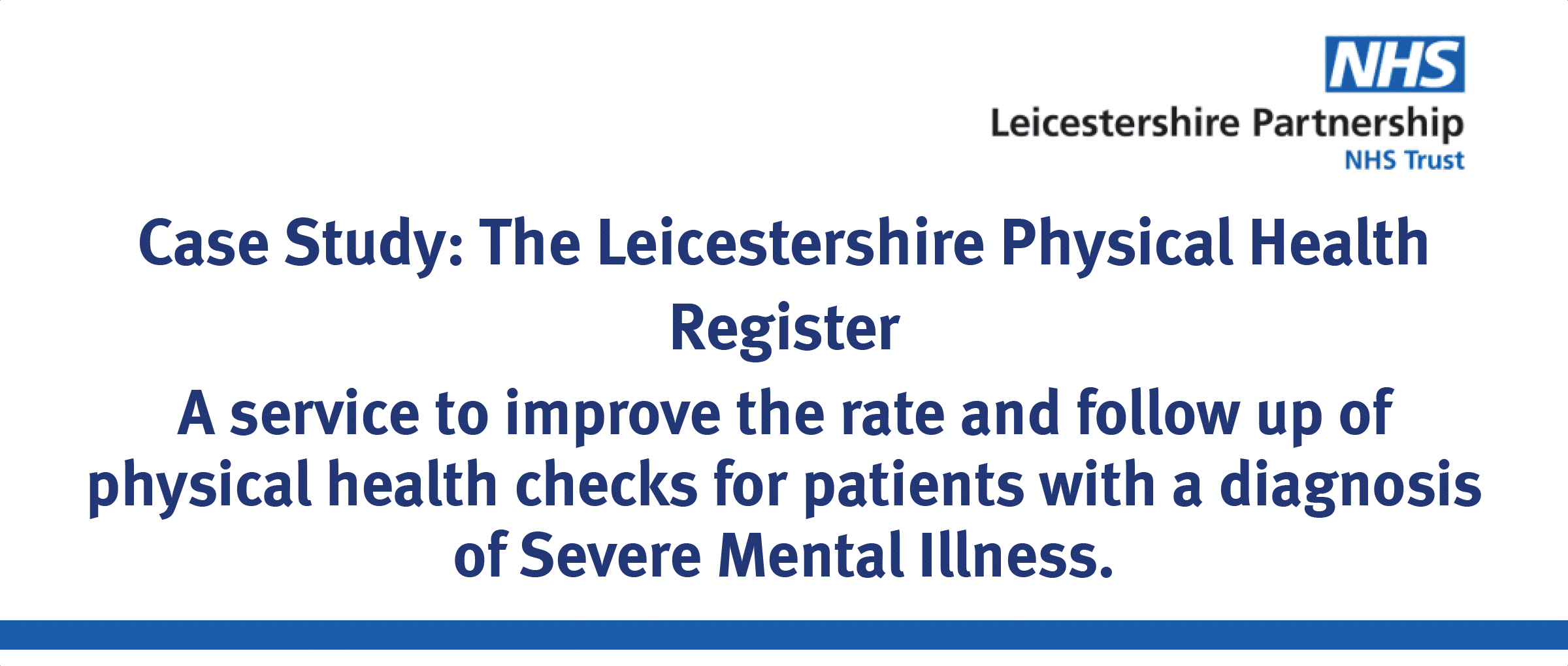Project Description
Case study to share the work Leicestershire Partnership NHS Trust has been doing to improve the rate of follow up of physical health checks for their patients with a diagnosis of Severe Mental Illness.
Click here to download the resource.
The Leicestershire Physical Health Register
A service to improve the rate and follow up of physical health checks for patients with a diagnosis of a Severe Mental Illness.
In 2014 a Commissioning for Quality and Innovation (CQUIN) framework for Mental Health Services was published by NHS England. CQUINs have at their core the aim of supporting improvements in the quality of services and the creation of new, improved patterns of care. One of the key targets within this framework was the full implementation of appropriate processes for assessing and documenting physical health checks for patients with a diagnosis of a severe mental illness (SMI). In Leicestershire a service was set up to meet the goals set out within the framework. The concept of this service was borne out of detailed discussions between the Medical Director (Dr Sateesh Kumar) and the Head of Pharmacy (Anthony Oxley), Leicestershire Partnership NHS Trust.
A Mental Health Pharmacist working within the trust, Dolly Sud, embraced the chance to set up this service from scratch and with support and resources created the Leicestershire Physical Health Register. This service achieved the highest results in the country for the 5 year duration of that CQUIN. After the CQUIN finished, the Trust decided to continue to fund the service to ensure that this care was maintained, but also to use the expertise and knowledge gained to inform and improve care and practice in other areas within the Mental Health Trust. One such development included the formation of a Physical Health Strategy Group within the Trust.
The service itself is based within the pharmacy, and networks and liaises closely with all the teams across the trust. The Lead Pharmacist, Dolly, and her team run the service day to day. Patients (inpatients, patients under the care of the early intervention team and patients who are on care programme approach) with a diagnosis of an SMI who are under the care of the trust are identified through electronic systems e.g., prescribing systems and electronic clinical record (SYSTMONE). Staff working on the team gather all the relevant information about the patient from different electronic records, including the pathology system where blood results are recorded, and individual patient’s clinical records. All this information is entered onto a centralised electronic database held in the pharmacy.
This centralised electronic database generates a blood form for any bloods which are due and outstanding; this form is prepopulated with all the patient’s details and the bloods that are due. This blood form is sent to the lead professional looking after the patient e.g., care coordinator. The blood form can either be used to be sent with the bloods taken by the care coordinator themselves, or given to the patient so they can have their bloods done anywhere within Leicestershire including phlebotomy clinics and GP surgeries. The Lead Pharmacist reviews all the blood tests and information for the patient and uses a risk calculator, e.g. QRISK2, to calculate a cardiovascular risk score for the patient. The pharmacist will contact the team who are looking after the patient to make appropriate recommendations for interventions, where needed, in line with national clinical guidance, e.g. pre-diabetes, elevated cardiovascular risk, and blood results outside of the reference range. All patients under the care of the Child & Adolescent and Family & Young Person’s service who are prescribed antipsychotics have recently been included in the cohort.
Some of the elements that have made this service a success include having a dedicated member of clinical staff who is passionate and has the tenacity and resilience to lead, access to resources including champions within nursing and medical directorates, and a multi-disciplinary approach. This approach saves teams a huge amount of time and labour in not having to access all the electronic systems or look up blood results or fill out blood forms. Feedback from patients and carers has not been formally sought but comments from these groups has been positive. Dolly is also undertaking a qualitative exploratory research study as part of a PhD exploring patients’ and carers’ views and experiences of care for their physical health.






